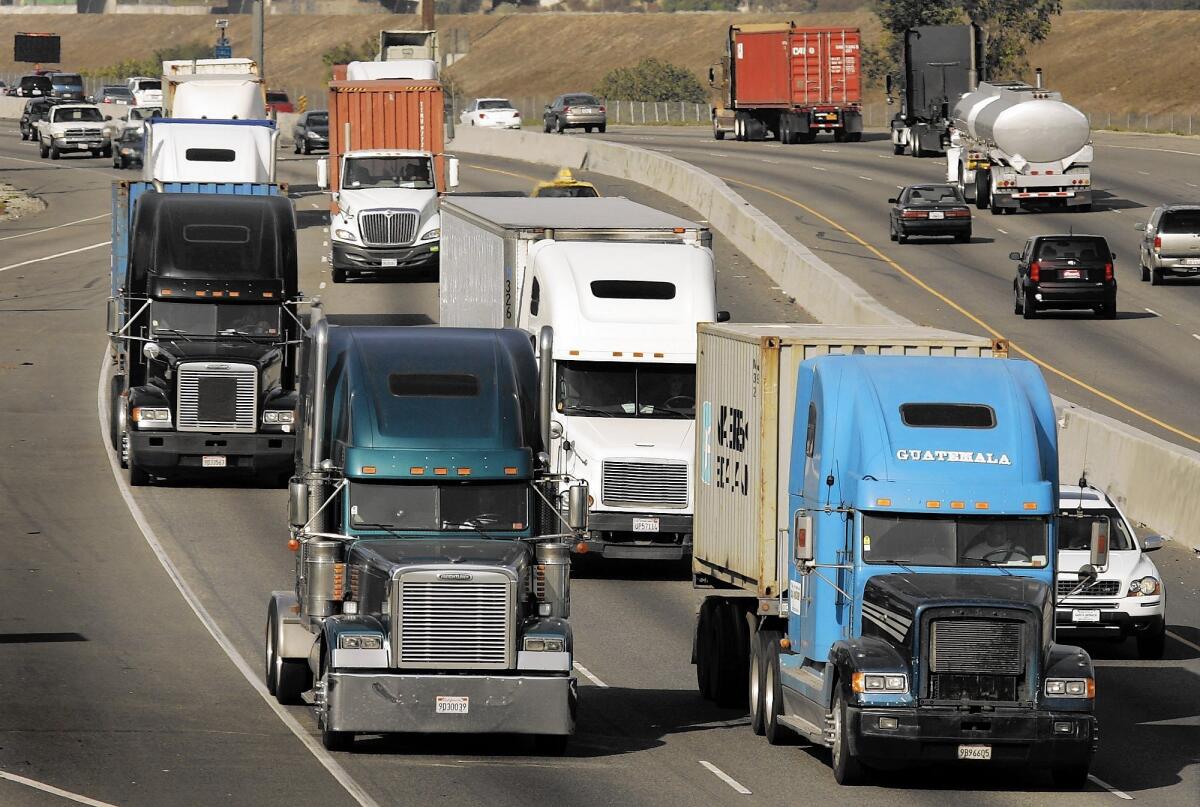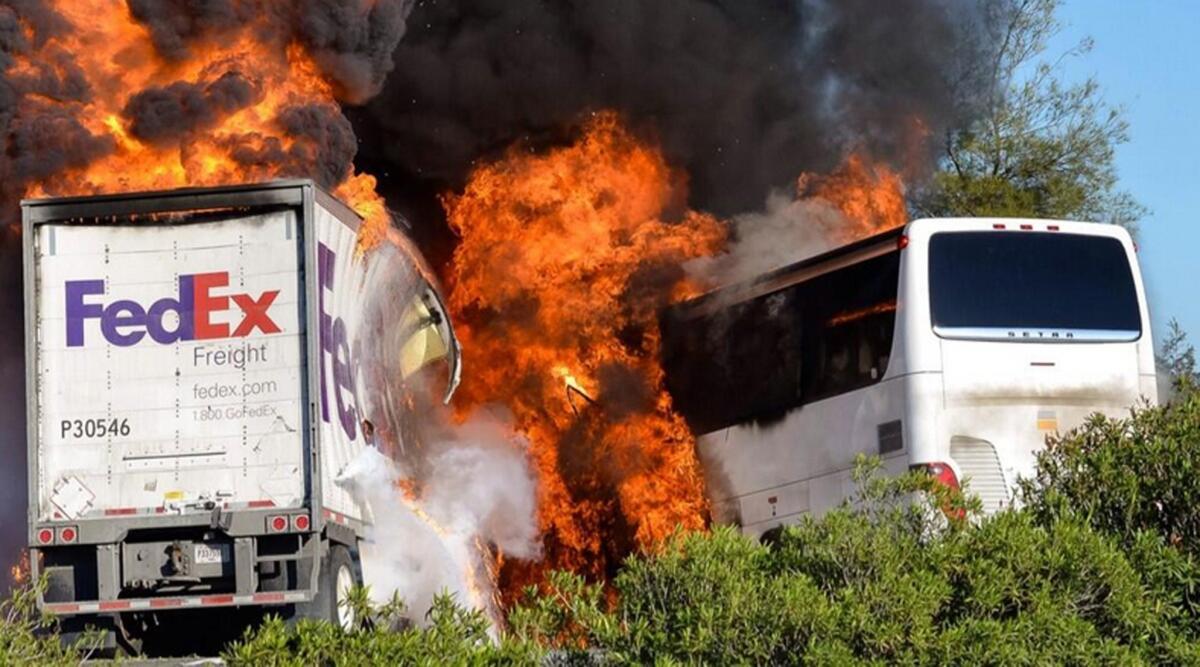Some California truck drivers may not be allowed to rest as often if this federal bill becomes law

- Share via
After half a century driving semitrucks, Charles Oaks, 71, developed a strategy to stave off fatigue during 14-hour days on the road.
He drinks cups of coffee and unsweetened tea, and, most importantly, takes a rest stop every four hours.
“I am going to take the stops so I can travel safely,” the Idaho-based driver said while sitting in his truck, parked near a McDonald’s in Vernon.
Some truck drivers in California, however, may not be able to rest as often as Oaks does if controversial House legislation under consideration this summer becomes law.
A provision in a House appropriations bill would allow federal regulations to exempt truck drivers who cross California boundaries from the state’s strict meal and rest requirements.
California law requires truck drivers — along with other state employees — to take a 30-minute meal break in their first five hours on shift, and another break when five more hours have passed. Employees must also take a paid 10-minute rest break every four hours of working.
Several other states, including Colorado and Kentucky, require similar rest breaks of their employees.
Federal regulations, on the other hand, require only that drivers take one 30-minute break in their first eight hours of driving.
Some officials in California are concerned that fewer breaks under the federal rules would lead to sleepier drivers, who often work exhausting 10-hour shifts. And they fear that could mean more accidents.
“They are putting in policy measures that ultimately diminish truck safety,” said Harry Adler, a spokesman at the Truck Safety Coalition, a national advocacy organization. “In this bill they are going in and trying to preempt states that want to go above and beyond in terms of providing meal and rest breaks.”

Los Angeles County alone saw 8,989 collisions, fatal and nonfatal, involving large trucks in 2016, according to data from the California Highway Patrol. There were about 15,000 big rig crashes in the entire state last year, or 38 collisions per 100,000 people.
The provision was introduced by Rep. David Valadao (R-Hanford) and originally crafted by Rep. Jeff Denham (R-Turlock) in proposed legislation from 2015. Denham has received more than $60,000 in contributions from truck organizations and political action committees for his reelection campaigns, according to federal election commission data.
Leaders of trucking companies, who generally support the provision, bemoan the frequency with which California drivers are required to rest, arguing that such stops disrupt drivers’ routes.
The patchwork of different state rules causes confusion for interstate drivers, industry leaders argue.
“It’s just bizarre the way… this plays out in the real world,” said Bill Sullivan, executive vice president of advocacy at American Trucking Assns. “You couldn’t have 50 states of meal and rest breaks.”
Sullivan believes the rule change would streamline truck breaks for interstate drivers and, in effect, improve the safety of truck drivers, who he said sometimes have to make dangerous decisions when pulling over for brief, mandated rests.
Opponents, however, charge that truck companies are looking to prioritize profits and delivery time over the safety of their workers.
The law would only affect the companies that operate in other states in addition to California. It’s unclear what percentage of truckers fall under this category. But opponents of the provision point to a potential loophole — some truckers for interstate companies only drive within California.
Some advocates worry that companies would pressure truckers into taking fewer breaks than California requires.
“Human beings have breaking points,” said Samuel Loesche, legal representative for the International Brotherhood of Teamsters. “The people who are advocating these proposals are playing a dangerous game in testing those breaking points.”
The Federal Motor Carrier Administration, which issues federal truck-driving regulations, declined to comment on the pending legislation.
The debate over the federal government’s right to supersede states’ rest regulations is a decade old, consisting of petitions and lawsuits that for the most part uphold longstanding state labor law.
In 2008, a group of truck companies petitioned the Federal Motor Carrier Safety Administration to recognize federal law as preempting state regulations, but the agency rejected that request.
Similarly, then-State Assemblyman Michael Duvall introduced an amendment bill in 2008 that would exempt truck drivers from state meal and rest break requirements — but that bill died in committee.
In 2014, the U.S. 9th Circuit Court of Appeals ruled that federal regulations could not preempt state labor law when it upheld a lawsuit filed on behalf of drivers, who alleged their company Penske Logistics did not allow them to take state-mandated rest breaks.
In that case, the federal Department of Transportation filed an amicus brief supporting the drivers and reaffirming longstanding state labor laws.
Most recently, Denham in 2015 introduced a similar rest stop amendment to a House bill, but the provision ultimately died in the Senate.
“It’s kind like the zombie bill,” said Rome Aloise, the president of Teamsters Joint Council 7, noting that the debate resurfaces every few years.
While some believe a rule change could endanger drivers, Florida trucker Daimon LaFreniere, 23, sees the federal regulations as a positive.
After parking his semitruck in the Vernon McDonald’s, LaFreniere posited that California’s requirement that drivers make frequent stops could be detrimental to truck drivers paid by the mile.
“That’s too many stops,” he said.
He and his driving partner, Nick Hastings, 22, switch off at the steering wheel when the other becomes tired. The days are long, but they don’t mind.
After all, LaFreniere said, “When the truck’s moving, we’re getting paid.”
Oaks, however, believes the stops are non-negotiable. He wouldn’t alter his rest stops if the bill passed.
“I made it this far,” Oaks said as he prepared to start a four-hour drive to El Centro last month. “I’m going to keep on going.”
ALSO
California Republicans face backlash for backing climate change program
Despite California’s strict new law, hundreds of schools still don’t have enough vaccinated kids
More to Read
Sign up for Essential California
The most important California stories and recommendations in your inbox every morning.
You may occasionally receive promotional content from the Los Angeles Times.












